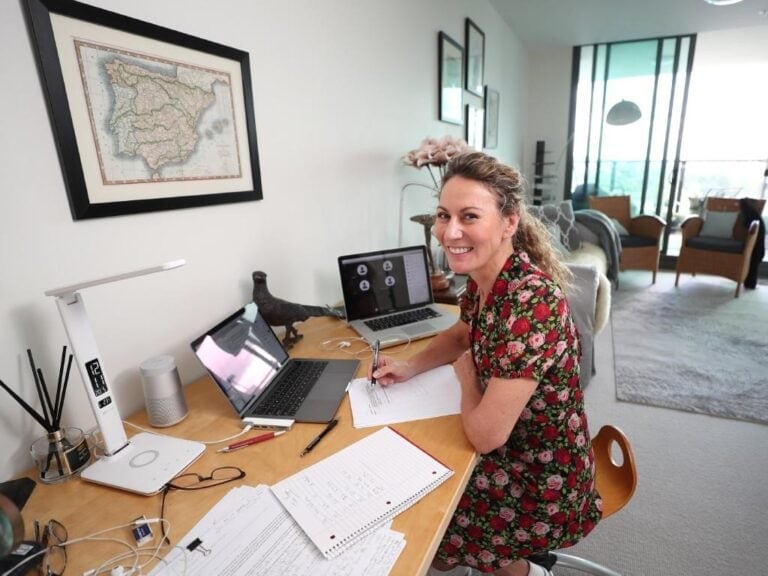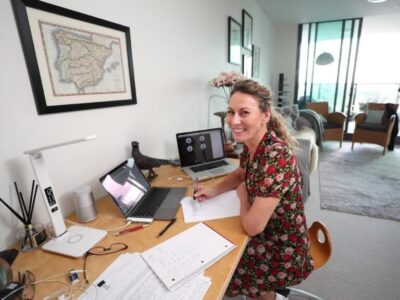Three million Australians prepare for post-coronavirus career change
 Three million Australians are planning a post-pandemic career change, making the jump into a completely different field. Here’s where you should be looking.
Three million Australians are planning a post-pandemic career change, making the jump into a completely different field. Here’s where you should be looking.
Melanie Burgess, Careers deputy editor, News Corp Australia Network
Three million Australians are planning a post-pandemic career change, making the jump into a completely different field.
Whether spurred by job insecurity or the discovery of a new skill during isolation down time, ING’s Future Focus research found 35 per cent of surveyed Australians wanted a new job after COVID-19, and 17 per cent were rethinking their career path entirely.
ING retail banking head Melanie Evans said many people were “clearly anxious” about the current situation, while others had time to think about whether their current job gave them purpose and meaning.
“At the end of the day, it’s Australians realising the new norm is not what it was three or six or 12 months ago,” she said.
“We are a resourceful bunch and we look at practical ways of taking control and taking pragmatic steps to do something about it.”
Nvoi group chief executive and JXT managing director Raife Watson said now was the “best time” to be exploring a career change.
“There is only so much running in a park and Netflix bingeing you can do – maybe take this time to think about your career,” he said.
The former Adzuna chief executive believed all hospitality and retail workers should be considering a new field as their jobs would be insecure, even into the future.
“(Those sectors) are opening up slowly (but) not all of those jobs will come back and they will be the first to go again if there is another (COVID-19) spike and we lock down again,” he said.
“Not just for coronavirus, but in any health pandemic, that’s going to be the play sheet – we know those jobs are gone straight away.
“If I was in hospitality or retail and could do a different job, I might try for a health career.”
He recommended career changers seeking job security set their sights on work in health and aged care, the public sector, information technology, logistics or construction.
“There is a lot of talk about securing our supply chains, so I wouldn’t be surprised if manufacturing – which was waning – will have opportunities going forward,” he said.
“Logistics employment was already increasing because of online shopping and delivery and that has doubled down.
“Construction is constantly being talked about to come back first. In terms of stimulus packages, money is being poured into that.”
Futurist Anders Sörman-Nilsson predicted new roles would also emerge following the pandemic.
For example, he forecast growing demand for medical tele-storytellers trained to explain diagnoses via digital interfaces; financial coaches that combined financial advice and psychological insight; and black swan risk managers that prepared companies for the most unlikely events.
Meanwhile, the top growth sectors of the future were predicted to be biotech, pharmaceutical and life sciences; cyber security; healthcare; robotics; agriculture; renewable energy; sustainability and wellness; grocery delivery; edtech; and online entertainment
“Pandemics do have a history of spawning cultural and labour transformation,” he said.
“Historically, the Black Plague spawned the birth of the Renaissance, and there was inclusion of women in the workforce after the Spanish flu.
“We are really seeing transformation and we predict a second renaissance as people start to re-skill or transform to join new growth industries in the future.”
FLIGHT ATTENDANT’S RADICAL CAREER CHANGE
Catherine Pearson had been an international flight attendant with Qantas for 31 years before she was stood down in response to the COVID-19 outbreak.
Knowing overseas travel was unlikely to return to normal this year, she wasted no time in making a career change into the aged care sector.
“My last flight was on the 14th of March and three of my passengers out of America ended up (testing COVID-19) positive,” she said.
“I had to go into isolation. I was negative but started looking for work straight away, trying to find something somebody needs.
“Aged care and care of individuals is just huge these days.
“I determined within two weeks to do the course with Sarina Russo Institute and two weeks after starting the course, I got a job as a lifestyle assistant.”
Visit Sarina Russo Institute for more information.
The Hamilton, Queensland, resident knew aged care work would be a good match as she had previously been a registered nurse and knew she loved working with people.
She has been working two days a week at an aged care home for the past four weeks while completing her Certificate III in Individual Support online.
“It’s just so good to be doing something so positive and working with people who have such history and character,” she said.
“There is going to be huge need for these sorts of things.
“People can sit back and feel threatened by COVID-19 or they can get trained and get into a workforce that is steady and where they are going to be required.”
TOP 10 FUTURE INDUSTRIES
- Biotech, pharmaceutical and life sciences
- Cyber security
- Healthcare
- Robotics
- Agriculture
- Renewable energy
- Sustainability and wellness
- Grocery delivery
- Edtech
- Online entertainment
SOURCE: Futurist Anders Sörman-Nilsson
Former flight attendant Catherine Pearson is loving her career change. Picture: Peter Wallis.
